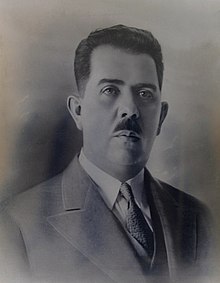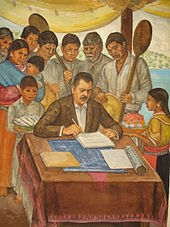Lázaro Cardenas del Río
Lázaro Cárdenas del Río (born May 21, 1895 in Jiquilpan de Juárez , Michoacán , † October 19, 1970 in Mexico City ) was a Mexican politician and general who was President of Mexico between 1934 and 1940 .
Cárdenas came from a rural region and took part in the Mexican Revolution as a young army officer . He gained political experience as governor of his home province and as a cabinet member under Plutarco Elías Calles .
Presidency
On December 1, 1934, Lázaro Cárdenas del Río became President of Mexico. At that time Mexico was still suffering from the effects of the revolution. On April 1, 1936, he banished Plutarco Elías Calles , the last general with dictatorial ambitions and previously Cárdenas' political supporter, from Mexico. He also succeeded in uniting the various forces within the National Revolutionary Party ( Partido Nacional Revolucionario , PNR) founded in 1929 . In doing so, he ensured that the party, renamed Partido de la Revolución Mexicana (PRM) in 1938 and Partido Revolucionario Institucional (PRI) in 1946 , provided all Mexican presidents until 2000. In contrast to his predecessors, Cárdenas himself drew his political power primarily from his popularity among the broad rural population as "one of them". He also supported the trade unions as massively as no president before.
On March 18, 1938, Cardenas nationalized the oil industry , which until then had been owned by the United States, Britain and the Netherlands, as well as the power plants. The foreign-owned national railway company had been nationalized as early as 1937. During this time, the Mexican oil company PEMEX , which still exists today, was founded . He carried out larger agrarian reforms than many of his predecessors and was thus able to break the rule of the large landowners. He founded the National Polytechnic Institute, took in refugees from the Spanish Civil War and initiated reforms that have shaped Mexico's development to this day. Under his successor Manuel Ávila Camacho , Cárdenas was Minister of War and the Navy until the end of World War II ; Mexico participated on the Allied side.
After his presidency, Cárdenas remained an important figure in the PRI and, above all, counteracted the conservative aspirations of the 1950s. Internationally he was involved in the peace movement; he was Vice and Honorary President of the World Peace Council and a participant in the Russell Tribunal . The Partido del Frente Cardenista de Reconstrucción Nacional , which was founded in 1987 and followed his ideologies, took on the name "cardenista" ( cardinistic ) based on his father's surname. His son Cuauhtémoc is also a well-known Mexican politician.
Honors
- Several places in Mexico are named after Cárdenas , including Ciudad Lázaro Cárdenas in the state of Michoacán . A park in Prague-Bubeneč bears his name.
Web links
- Lazaro Cardenas in the Internet Movie Database (English)
- Newspaper article about Lázaro Cárdenas del Río in the 20th century press kit of the ZBW - Leibniz Information Center for Economy .
See also
| personal data | |
|---|---|
| SURNAME | Cárdenas del Río, Lázaro |
| BRIEF DESCRIPTION | Mexican politician and general, President of Mexico |
| DATE OF BIRTH | May 21, 1895 |
| PLACE OF BIRTH | Jiquilpan de Juarez , Michoacan |
| DATE OF DEATH | 19th October 1970 |
| Place of death | Mexico city |

